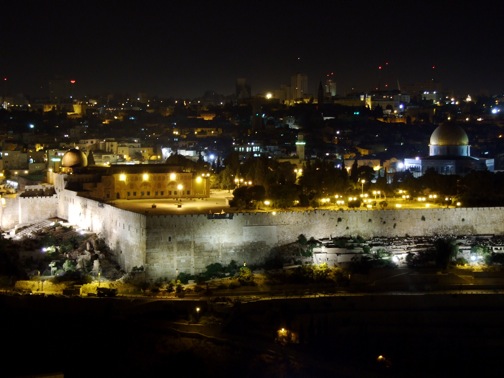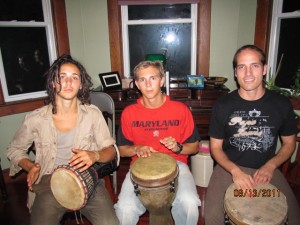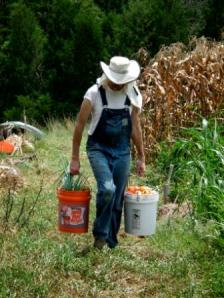From Hiking and Riding Camels Across Israel to Baltimore, Maryland…
Last summer, we spent a month in living in the outdoors, hiking, biking, and riding camels across Israel. I was one of two counselors for a group of teenage boys. It was an awesome trip. Type “Derech Hateva” into the search box for more about this.
Anyway, Came to Baltimore for a few days because two of the Derech Hateva boys are here. We’re spending a few days together getting back to nature, with getting spiritual in the outdoors: hiking, tai chi, praying, and meditating.
Last night after havdalah we had an awesome jam session on the drums.
We are in Baltimore. It’s a very Jewish neighborhood where we are staying. Almost every house is Jewish. I like this because the streets were quiet Friday night and Saturday because not many people were driving.
Shabbat morning I heard Rabbi Dovid Katz speak. Now, normally I’ve got issues with Rabbis talking for 35 minutes during the service, but not with Rabbi Katz. He’s a well-known Rabbi, professor and historian and he had some good stuff to say.
Read MoreParshas Va’eschanan: Building Our Own Cities of Refuge

We should all strive to make our homes into real places of refuge, by cultivating an atmosphere of love, openness, and security.
As I write this, I am sitting on a bus. It’s a nice bus, a Greyhound, not a third-world bus that seems to be falling apart. We are leaving behind Virginia and my family, leaving behind the home I spent at least a few years in as I was growing up.
Rabbi Ben and I don’t have a home of our own (unless you count our backpacks – we travel like turtles!) so our parents’ homes are a bit like places of refuge for us. If, G-d forbid, something happened and we had nowhere left to go, we would have somewhere to turn. I think this is true even for those of us who aren’t traveling: if something happened, at the very least we can turn to our families for support. (At least, this is the way it should be, ideally.) Our family is our place of refuge.
This week’s Torah portion has a stunning lineup of commandments the Jews are reminded about just before Moses dies. One of these is the concept of cities of refuge. If one person accidentally kills another, he must run to the nearest city of refuge so that he will not be killed by the vengeful family. The Jews are even obligated to put up clear signposts telling the person exactly where to run to get to the nearest city of refuge.
Now, I’m not suggesting that if you accidentally kill someone you should go running to your house (you probably should go to the police)… And you should probably visit your parents even when you haven’t done anything wrong. Yet, we all make mistakes in our life. And when we do, we need somewhere to run. Even if nobody is pursuing us, we need to know we have a safe place to go to. (Haven’t you ever had a bad experience and just felt that “I want to go home and hide” feeling?) Not only do we need a safe place, but we need clear instructions on how to get there, every step of the way, because when we’re feeling terrible about what we’ve done, the mistake we’ve made, we might not be thinking too clearly.
When I’m traveling, I feel comfortable just knowing I have somewhere to go if I ever really need it. It’s an important lesson on the value of family, trust, and support. Everybody needs to know that they have a ‘city of refuge’ – even though we hope to never have to use it.
As we move into the coming week, let’s focus on making ourselves and our homes into cities of refuge for our friends and family. I hope that when something happens to my loved ones, they feel like they can run to me… Even while at the same time, I hope they won’t need to use it. Still, if we focus on making our homes safer and more accessible, we and our families stand to benefit by growing together, growing stronger, and growing closer.
Shabbat shalom!
Read MoreWhen it Comes to Farming and Planting Fruits and Vegetables There are Some Jewish Laws, Halachot From the Torah One Needs to Consider
So as I blogged about earlier this week, Last Sunday Rachel and I visited a farm where we picked vegetables with farmer Ben and his wife Lisa. http://travelingrabbi.com/2011/08/08/rabbi-ben-meets-farmer-ben/
The farm is in a beautiful area which is on a one hundred acre plot of land. There is a small pond where Rachel caught a fish, and a river that runs alongside the property. Most impressive is an old colonial home with the first parts built in the 1700’s. It has the old colonial charm to it. Walking through it is like going back in time. Some of the furniture in there must be a couple hundred years old.
Farmer Ben does not grow stuff on all one hundred acres. He uses a small area where he rotates various crops as the seasons change.
Being a traveling Rabbi, I had to check out that all was okay from a halachic point of view. There are many laws of farming that apply but more so in the land of Israel. Outside of Israel, the main two laws would be ‘Kilayim’ and ‘Orlah.’
Kilayim is the prohibition of growing certain produce together. Grape vines may not be planted alongside grains and vegetables. Further, there are certain vegetables, legumes, and grains that are Biblically prohibited to be planted together.
The other prohibition to take into account is ‘Orlah.’ After planting a fruit tree, the fruit is forbidden to be eaten for the first three years. Fruit means anything on which we say the blessing ‘Borei Pri Ha’etz.’ Thus, grapes and blueberries are fruits and one would need to wait three years from planting before eating their fruits.
Tomatoes, though some may consider them a fruit, are a vegetable according to the Torah. One would not have to wait three years before eating them. This would be impossible. The same with bananas, on which we say the blessing ‘Ha’adama;’ they are not considered to be a fruit according to the Torah.
Anyway, Farmer Ben’s farm was kosher and in perfect order. And the vegetables that we are now eating are delicious!
Read MoreTisha B’Av: Hashem Is Homeless… And So Are We…

Last year on Tisha B'Av I was in Jerusalem. Seeing the destruction that remains where the Beis HaMikdash should be standing was sobering.
For Rabbi Ben and I one of the most dreaded questions anyone can ask is, “Where do you live?” The truth is, we don’t live anywhere – that’s why Rabbi Ben is the Traveling Rabbi. So I simply respond by telling them, “Oh… We’re homeless.”
It’s true, we are homeless – both literally and figuratively. What shocks people most is that we don’t have any one spot on tierra firma that we call home. “But… where do you sleep? Where do you keep all your stuff? When you go ‘home,’ where do you go?” People ask questions like this all the time. Usually this is followed by some sort of shock – most people fantasize about having “no responsibilities” or “traveling,” but until they meet us, they don’t grasp the full implications of what this kind of lifestyle means. We don’t have a set destination. We don’t have an ending date. We live out of our backpacks. Our lifestyles, like our lives here on this earth, are impermanent and constantly changing.
That rootlessness is something we should all be feeling today. On Tisha B’Av, we are reminded that G-d’s home has been destroyed and that as a result, we have been exiled from ours. Sure, we build communities and houses and we get comfortable and even happy – but none of this is home. We can only have a home when G-d has a home, too.
We need to wake up and realize that we are missing out.
Imagine waking up one morning. Everything is fine. You go out for a walk and when you come back, your house – and all its contents – are up in flames. Now imagine that your entire life’s savings were stored in your mattress. And your friends and family won’t help you out or take you in. You have no home, no place to sleep, nothing. How do you feel?
This is, in fact, how we should all feel, all of the time. In a spiritual sense, this is exactly what has happened to us. And if we want all those things back – the house, the security, the money – we have to work hard to earn it all back, bit by bit. This is what we should learn from Tisha B’Av. Physically, G-d has lost His home – but spiritually, we have lost ours. And if we want it back, if we want that closeness to G-d, that security, we have to work hard for it. We have to work on our middos (character traits) and concentrate on being better people and reversing the sin of sinas chinam (baseless hatred) that caused the Temple to be destroyed.
Today and every day, we are all homeless. Let’s try to remember that. And now… let’s try to rebuild.
Read More







